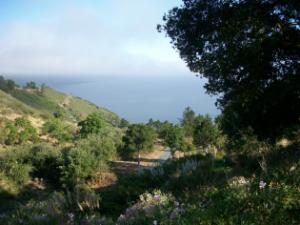The sea pronounces something, over and over, in a hoarse whisper. I cannot quite make it out. Annie Dillard
In my “Apocalypse” seminar today, we will be considering the destruction of Pompeii in 79 CE caused by the volcanic eruption of Mount Vesuvius (we consider all sorts of happy things in this course). The one written report of the event from Pliny the Younger who observed the eruption from the other side of the bay from Pompeii, notes that the eruption was both “beautiful and terrible,” a conjunction that many over the centuries have noted and wondered about. It always makes me think of the ocean.
I am well aware that many people, including perhaps a number of you reading this essay are ocean worshipers and can’t think of anything more attractive, peaceful and fulfilling than a day either at an ocean beach or on a boat on the ocean. I’m not a member of your club. Some look at or experience the ocean and are struck by feelings of peace and beauty. The ocean is indeed beautiful, but for me its beauty speaks of power, vastness, and a certain amount of fear.
 A number of years ago I spent a summer week at a Benedictine hermitage on a steep mountain overlooking Big Sur and the vast Pacific Ocean. Day after day I was unable to clearly distinguish the horizon between the brilliant blue sky and the equally brilliant blue ocean. I woke up every morning with the Pacific at my feet feeling a bit tense and edgy, as if I was in danger of being swallowed up. The beauty of the ocean puts some people in a peaceful place, but it makes me nervous. As she often does, Simone Weil nails this:
A number of years ago I spent a summer week at a Benedictine hermitage on a steep mountain overlooking Big Sur and the vast Pacific Ocean. Day after day I was unable to clearly distinguish the horizon between the brilliant blue sky and the equally brilliant blue ocean. I woke up every morning with the Pacific at my feet feeling a bit tense and edgy, as if I was in danger of being swallowed up. The beauty of the ocean puts some people in a peaceful place, but it makes me nervous. As she often does, Simone Weil nails this:
What is more beautiful than the effect of gravity on sea waves as they flow in ever-changing folds, or the almost eternal folds of the mountains? The sea is not less beautiful in our eyes because we know that ships are sometimes wrecked. On the contrary this adds to its beauty.
Immanuel Kant had this tension in mind when he distinguished in his aesthetics between the “Beautiful” and the “Sublime.” The Beautiful refers to things that produce aesthetic pleasure and feelings of happiness. Things that are Sublime can also be beautiful, but tend to overwhelm us, disturb us, or even frighten us. The Sublime is “awesome” and “terrible” in the original senses of these words—it inspires awe and terror. Are you attracted and repelled by the same thing or experience? Do you consider something to be both beautiful and terrifying in its awesome, often destructive power? That’s the Sublime—and that’s how the ocean impacts me. It is both beautiful and disturbing, attractive and frightening. The ocean is sublime.
Just so that you ocean-lovers out there don’t think I’m nuts, the authors of the Psalms in the Jewish scriptures agree with me. Over and over again, the Psalmist reminds us of the awesome power and terror of the sea; even more provocatively, these reflections are frequently used as a bridge to talking about God, the ultimate example of sublimity. Sometimes the Psalmist describes the power of the sea, assuring us that God’s power is even greater. Psalm 33 tells us, for instance, that “God collects the waves of the ocean; and collects the waves of the sea,” in control of even the most terrifying force imaginable. This can be source of comfort.
Psalm 46—God is for us a refuge and strength, a helper close at hand in time of distress, so we shall not fear though the earth should rock, though the mountains fall into the depths of the sea, even though its waters rage and foam, even though the mountains be shaken by its waves.
or of a petition for rescue from the often ocean-like overwhelming power of human reality–
Psalm 69—Save me from the waters of the deep lest the waves overwhelm me. Do not let the deep engulf me, nor death close its mouth on me.
Most interesting is when the Psalmist begins to attribute the very sublime, fearsome aspects of the ocean directly to God.
Psalm 42—Deep is calling upon deep, in the roar of waters; your torrents and all your waves swept over me.
It is one thing to seek divine protection from the terrible and awful contingencies of human experience; it is another to attribute that very terrible and awful beauty to the divine itself. If what is greater than me is the epitome of the sublime, meaning that it not only is inexpressibly beautiful but also is unpredictable and terrifying, how do I respond? Is it possible for a mere, non-sublime human being to be in relationship with something like that?
If I am disturbed and made nervous by the ocean, there is a simple solution—stay away from the ocean. Good advice, but for me at least similar advice does not work concerning God. I’ve described myself at times as “God-obsessed” (as the poet Novalis once described Spinoza), meaning that no matter how unpredictable and disturbing the divine might be, I can’t turn away. That being the case, I find the following simple observation from Rowan Williams helpful: “If you want to swim, you must begin to understand the sea.” The Jewish mystics go so far as to suggest that if God is like the ocean, we are the waves on that ocean. God invites an intimacy so close that at times the horizon between the divine and human becomes as blurry as the horizon between the ocean and sky at Big Sur. And isn’t that the promise of incarnation—the fusion of divinity and humanity?
The older I get, the more time I spend trying to stay afloat in the divine sea, the more I am convinced that this is not a problem to be solved or an issue to be sorted out. It is rather something to be lived. I agree with the author of Psalm 84—“My soul longs and thirsts for the living God.” And according to Antoine Saint-Exupery, that is a good start.
If you want to build a ship, don’t drum up the people to gather wood, divide the work, and give orders. Instead, teach them to yearn for the vast and endless sea.













